Paris attacks: Millions rally for unity in France
- Published
Mishal Husain reports from Paris: ''The applause goes up from the crowd''
More than three million people have taken part in unity marches across France after 17 people died during three days of deadly attacks in Paris.
Up to 1.6m are estimated to have taken to the streets of the French capital.
More than 40 world leaders joined the start of the Paris march, linking arms in an act of solidarity.
The marchers wanted to demonstrate unity after the attacks on satirical magazine Charlie Hebdo, police officers, and a kosher supermarket.
The French government said the rally turnout was the highest on record.
Lyse Doucet reports from Paris: ''Francois Hollande was at the head of the march''
The rally, led by relatives of the victims of last week's attacks, began at the Place de la Republique and concluded in the Place de la Nation.
Several other French cities also held rallies. The interior ministry said turnout across France was at least 3.7 million, including up to 1.6 million in Paris - where sheer numbers made an exact tally difficult.
Rallies also took place outside of France, with thousands of people gathering in London, Washington, Montreal and Berlin.
In Madrid, several hundred Muslims held banners saying "Not in our name" next to the train station where in 2004 Islamist bombings killed nearly 200 people.
World leaders, including British Prime Minister David Cameron, German Chancellor Angela Merkel, Israeli Prime Minister Benjamin Netanyahu, Palestinian President Mahmoud Abbas, Malian President Ibrahim Boubacar Keita, EU President Donald Tusk, and Jordan's King Abdullah II joined the beginning of the Paris march.
"Paris is the capital of the world today," French leader Francois Hollande said.
The leaders observed a minute's silence before the march began.
About 2,000 police officers and 1,350 soldiers - including elite marksmen on rooftops - were deployed in the capital to protect participants.
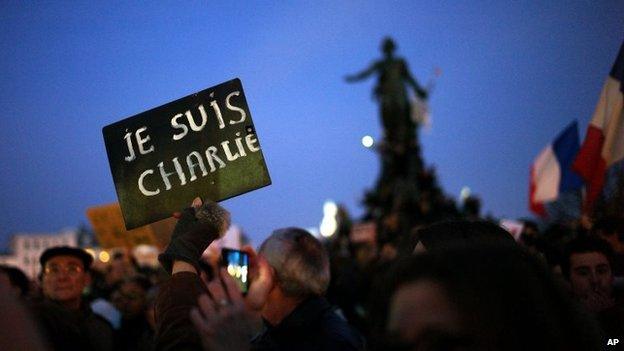
More than three million people across France marched for unity
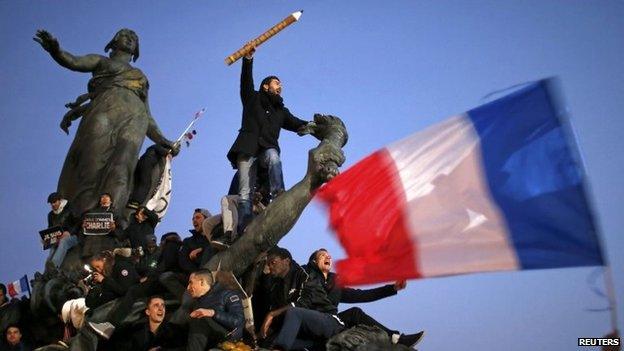
Demonstrators held up pencils to show their support for free expression
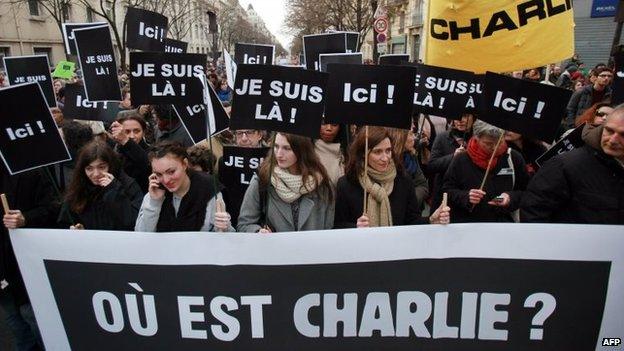
Marchers held a banner reading "Where is Charlie?" and placards reading "I am here"
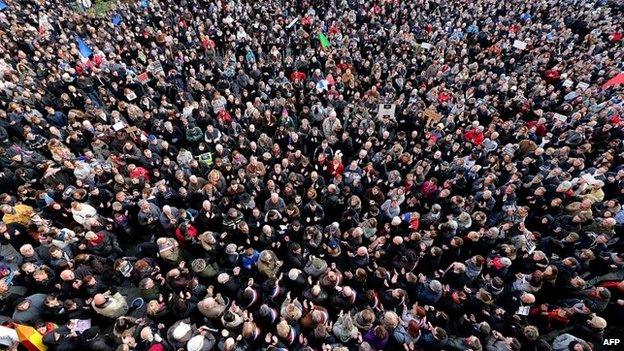
Many French people took part in marches outside Paris, including at this rally in Reims
The Paris march was split into two routes for security purposes.
Marchers chanted "liberte" ("freedom") and "Charlie", in reference to Charlie Hebdo magazine.
Some waved French flags, cheered, and sang the national anthem.
Samia Ghali, mayor of one of Marseille's districts, told the BBC that people there were marching for tolerance and co-existence. Marseille is the city with the largest Muslim population in France.
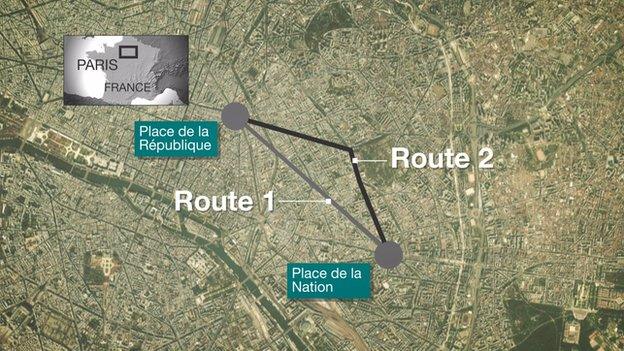

At the scene - Patrick Jackson, BBC News, Paris
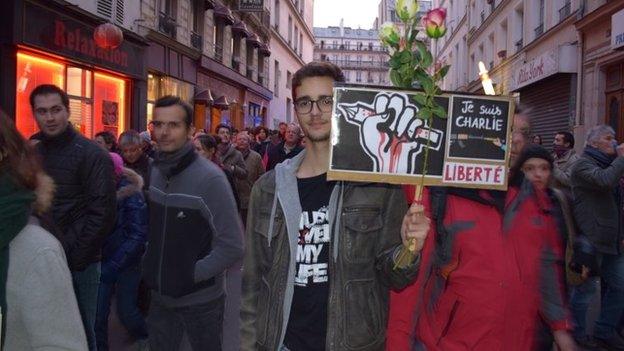
Marchers headed towards the Place de la Nation for the final rally
So many people were crammed into the Place de la Republique that it created a bottleneck. Some marchers had to filter down side streets to reach the Place de la Nation for the final rally.
They streamed past the cafe where I was working, wrapped against the chill as the sun went down, so many faces beaming with pride, voices still not too hoarse for another yell of "Charlie!" Their hands must have been sore from clapping.
"This is serious, this was an attack on freedom, we cannot allow this," said Laurent. The march was so crowded it took him, his wife Isabelle and his daughter Coline two hours to walk just 2km (1.2 miles).
"Our values are liberty, equality and fraternity and we cannot allow terrorists to dictate to us," he added.
"We had to get into the streets to show we are not afraid," said Isabelle.

Solidarity marches were also held in world cities including London, Madrid, Cairo, Montreal, Beirut, Sydney and Tokyo.
Gunman video
Ahead of the rally, a video emerged appearing to show the supermarket attacker, Amedy Coulibaly, pledging allegiance to the so-called Islamic State.
The video appears to show Amedy Coulibaly explaining his motivation
In the video, he said he was working with the Charlie Hebdo attackers: "We have split our team into two... to increase the impact of our actions."
He killed four hostages seized at the Hyper Cacher supermarket on Friday before being shot dead by police. The four victims will be buried in Israel on Tuesday.
Coulibaly is also believed to have shot dead a policewoman in Montrouge on Thursday, and has now been linked by prosecutors to the shooting and wounding of a 32-year-old jogger in a park in Fontenay-les-Roses, in south-west Paris, on Wednesday.

Yohan Cohen, Philippe Braham, Yoav Hattab and Francois-Michel Saada were killed at the kosher supermarket
His partner, Hayat Boumeddiene, is still wanted by police - although she is thought to have fled France last week. Officials believe she may have entered Turkey en route to Syria.
Interior Minister Bernard Cazeneuve says France will stay on high alert in the coming weeks.
Gavin Hewitt reports: "There is a sign that this is a defining moment for France"
He hosted a meeting on Sunday morning of fellow interior ministers from across Europe, including the UK's Theresa May, to discuss the threat posed by militants.
Following the meeting, the ministers issued a statement saying that greater internet and borders surveillance was needed to combat terrorist attacks.
Satire attacked
The violence began on Wednesday when two brothers raided the offices of the satirical magazine Charlie Hebdo.
Said and Cherif Kouachi - who were shot dead by police on Friday - killed 11 people at the magazine offices in the French capital on Wednesday, and a policeman in a nearby street.
In the wake of the attacks, police detained people believed to be connected to the killers - including family members.
Cherif Kouachi's brother-in-law, named as Mourad Hamyd, reportedly handed himself in to police but was released without charge and denounced the violence on Sunday.
"This attack is horrific - a horrible crime", he told AFP news agency.

How the attacks unfolded (all times GMT)
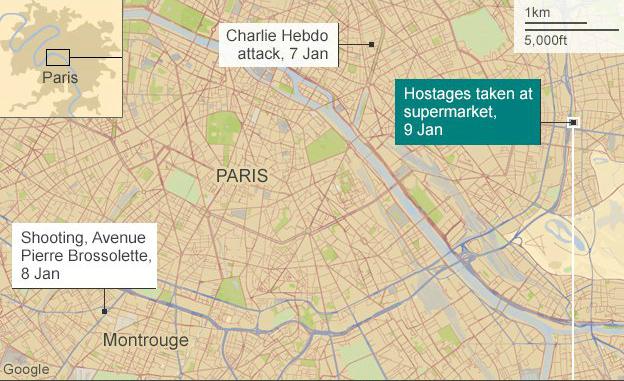
Wednesday 7 January 10:30 - Two masked gunmen enter Charlie Hebdo offices, killing 11 people, including the magazine's editor. Shortly after the attack, the gunmen kill a police officer nearby.
11:00 - Police lose track of the men after they abandon their getaway car and hijack another vehicle. They are later identified as brothers Said and Cherif Kouachi.
Thursday 8 January 08:45 -A lone gunman shoots dead a policewoman and injures a man in the south of Paris. Gunman later identified as Amedy Coulibaly.
10:30 - The Kouachi brothers rob a service station near Villers-Cotterets, in the Aisne region, but disappear again.
Friday 9 January 08:30 - Police exchange gunfire with the Kouachi brothers during a car chase on the National 2 highway northeast of Paris.
10:00 - Police surround the brothers at an industrial building in at Dammartin-en-Goele, 35km (22 miles) from Paris.
12:15 - Coulibaly reappears and takes several people hostage at a kosher supermarket in eastern Paris. Heavily-armed police arrive and surround the store.
16:00 - Kouachi brothers come out of the warehouse, firing at police. They are both shot dead.
16:15 - Police storm the kosher supermarket in Paris, killing Coulibaly and rescuing 15 hostages. The bodies of four hostages are recovered.

Are you taking part in the rally? If you are happy to speak to the BBC, please email us at haveyoursay@bbc.co.uk, external please remember to include a contact number.
Send your pictures and videos to yourpics@bbc.co.uk, external or text them to 61124 (UK) or +44 7624 800 100 (international). Or you can upload here, external.
Read the terms and conditions.